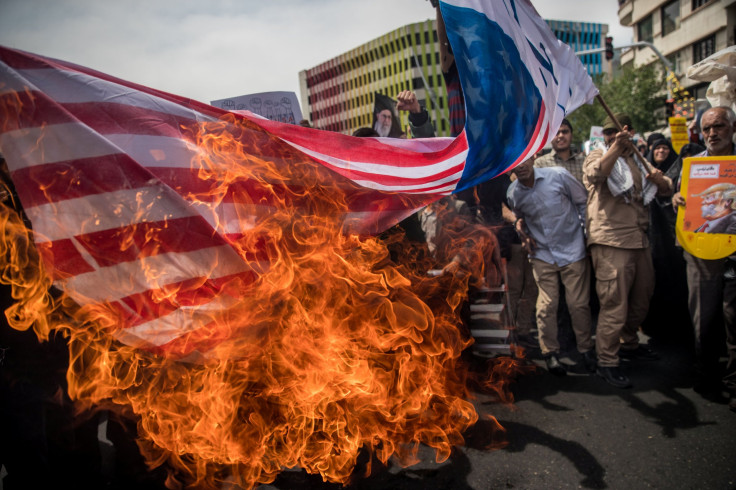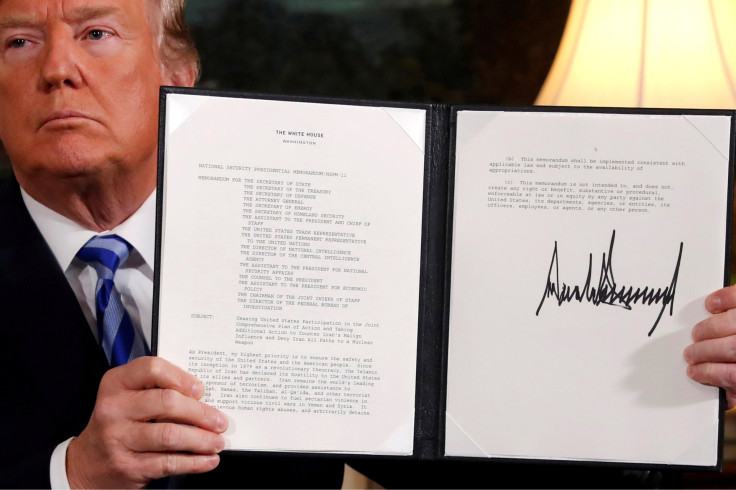Trump's high-stakes gamble on the Iran nuclear deal could work

U.S. President Donald Trump has announced the United States’ intent to withdraw from the 2015 Iran nuclear deal, formally known as the Joint Comprehensive Plan of Action.
Even though the U.S. State Department confirmed Iran had adhered to the terms of the agreement, Trump refused to certify that Iran was compliant.
Iran has every economic and political motive to sustain the agreement. The country is unlikely to reinstate its efforts to enrich uranium since the start-up costs are significant, the promise of a payoff is so small and, most importantly, such steps would impel the Europeans to abandon the agreement.
Though Israel provided a great deal of proof that Iran had lied about its nuclear program in the past, no evidence was offered that Iran was continuing the past record of deceit. The vast majority of experts agree that there is a greater likelihood of an arms race in the Middle East without the agreement than with it.
Yet Trump claimed: “The Iranian regime is the leading state sponsor of terror. It exports dangerous missiles, fuels conflicts across the Middle East, and supports terrorist proxies and militias such as Hezbollah, Hamas, the Taliban, and al-Qaeda.”
I am a strong supporter of the agreement. I believe the treaty is better than any of the alternatives. Yet I still want to offer a possible defence of withdrawal. There is a chance the reimposition of sanctions could work. However, it is a high-risk gamble.
What makes defending these moves difficult is that Trump’s actions are often immersed in lies and distortions. It is simply not true that Iran has been violating the agreement and secretly preparing to resume the production of nuclear weapons.
What is true is that the deal did not allow an unqualified right to inspect military facilities. It did not address the regime’s development of missiles that could deliver nuclear warheads. It did not constrain Iran’s destabilizing activities in the region. In a worst-case scenario, Iran could ramp up not only its uranium enrichment, but its regional military aggression.
Not a bilateral agreement
When Trump signed the presidential memorandum reinstating sanctions, he provided an additional opportunity to clarify and strengthen the agreement.
But not one of the other six signatories to the agreement believe that it would be possible, let alone to do so in the 120 days before American sanctions were actually reimposed. They continue to support the nuclear deal and recently lobbied Trump not to withdraw.

Russian President Vladimir Putin and German Chancellor Angela Merkel reaffirmed their commitment to preserving the 2015 nuclear agreement. Russian Foreign Minister Sergei Lavrov denounced the U.S. pullout as a violation of United Nations Security Council Resolution 2231. European Union foreign policy chief Federica Mogherini committed the 28-nation bloc to the nuclear agreement.
Trump, meantime, has begun the process of reimposing sanctions, targeting not only nuclear activities but Iranian energy, petrochemical and financial sectors .
Some sanctions target only Iranian entities; others punish third countries doing business with Iran. Not only would foreign subsidiaries of U.S. companies be banned from dealing with Iran, but there would be secondary sanctions on foreign companies engaged in Iranian financial, nuclear and petrochemical transactions.
European financial and petrochemical companies will be in a quandary, caught between the policies of their own governments and the dark cloud of sanctions launched by the Americans.
A flawed deal
Trump has three sets of explanations for withdrawal.
First, he promised to tear up this “worst of all deals” and the “most one-sided transaction into which the U.S. has ever entered” when he was running for president.
Second, he’s a critic of the contents of the deal.
Third, he implies that Iran has not abided by its terms. But as mentioned, he offers no evidence.
There’s no question the deal has flaws. Four months ago, when Trump announced that he would not lift sanctions again, he offered four areas where improvement was required:
All sites requested, not just nuclear sites previously identified, must be available to international inspection;
The agreement must guarantee that Iran will never again come close to possessing nuclear weapons;
Trump implied that when the expiration date of some of the terms pass, Iran would resume preparing for and producing nuclear weapons;
The deal must include new provisions to impel Iran to curtail its program of missile development; if not, Iran would be in breach of a new, revised agreement.
A chance to improve deal?
The deal would benefit from such clarifications and inclusions. The agreement could, in fact, be much more explicit that the limitations on Iran developing a military nuclear program are intended to be “eternal.”
The negotiations on the existing agreement were never able to overcome the dilemma of how to allow Iran to develop and produce nuclear material for peaceful versus military purposes.
The inspection system could also be improved since the existing one does not provide a monitoring strategy that would prevent the development of new sites.
The previous negotiations failed to limit Iran’s development of its international missile program. Iran argued the program is necessary for its conventional, non-nuclear defence system, and could not be included in a nuclear agreement.
Iran convinced previous negotiators this issues was a deal-breaker, and the decision was made to focus only on nuclear, not on conventional military developments.
It’s this threat, rather than all the noise about the nuclear dimensions of Iran’s militarization, that upsets Israeli Prime Minister Benjamin Netanyahu the most.
Trump’s strategy
Trump’s tactics and strategy do have a rationale. Iran, like Turkey and Saudi Arabia, are newly emergent bullies in the Middle East.
Saudi Arabia largely sees eye-to-eye with the U.S. Turkey, though no longer an ally in practice, greeted the American withdrawal from the nuclear deal as an economic opportunity for the Turks.
Iran, on the other hand, is still considered an implacable enemy and, more seriously, a direct threat to America’s strongest ally in the region, Israel.
There’s a chance that the U.S. tactic could work and result in a stronger deal given a number of factors: The degree to which Iran is over-extended in the Middle East, the degree to which those who benefited enormously from the lifting of Iranian sanctions now have a vested interest in not restoring them, and the poor state of the Iranian economy even after sanctions were lifted due to risk-averse potential investors nervous about what Trump was planning.
Many worry that the U.S. withdrawal from the Iran nuclear deal sends the wrong signal to North Korea that America cannot be trusted to commit to any deal. Others argue, with some legitimacy, that it was Trump’s strong-arm tactics that forced North Korea to the bargaining table regarding its own nuclear arsenal.
As South Korea did in Asia, it’s possible Europeans can play the “good cop” role to back up Trump’s “bad cop” in the Iranian situation.
But that possibility seems remote. The Europeans have been working tirelessly to try to get the Iranians to offer concessions but have been unsuccessful. More publicly, they have been openly critical of Trump’s tactics and rationale and have insisted they’ll stay in the deal.
The prospects of correcting the deal are dim. However, they exist. Do we want to play high-risk poker over the issue of nuclear weapons?
Iranian President Hassan Rouhani has signalled that he won’t abandon the deal as long as the Europeans stay in it, suggesting that the U.S. reimposition of sanctions won’t set Iran down the road to resuming its nuclear program.
The U.S. will now have to put enormous pressure on European companies and banking institutions to comply. It may become apparent that the Europeans no longer have faith in American leadership and are prepared to launch an effective resistance program to U.S. unilateral action.
Merkel recently stated that Europe could no longer rely on the U.S. for protection and must take its destiny into its own hands.
France has insisted that Europeans cannot continue as “vassals,” as the EU scrambled to save the accord and the billions of dollars in trade it unleashed. French Finance Minister Bruno Le Maire said Europe should not accept that the U.S. is the “world’s economic policeman.”
On the military front, Israel has been emboldened and is now attacking Iranian facilities in Syria openly and widely, especially after Iranian forces in Syria unleashed 20 Grad and Fajr rockets against Israel.
Perhaps Trump doesn’t care. Perhaps he only wants to demonstrate he’s a tough guy who keeps his campaign promises.
Trump is engaged in a high-stakes gamble. If he’d demonstrated any sign that he understands the risks, it would be easier to give him the benefit of the doubt. But almost all evidence suggests that his gambit is based more on his disposition than on a well-considered strategy.
The possibility of hope seems drowned out by the enormous tears to be shed — as we lose one more initiative towards a better, even if very flawed, world.
ersation.com/profiles/howard-adelman-458878">Howard Adelman, Professor Emeritus Philosophy, York University, Canada
This article was originally published on The Conversation. Read the original article.





















